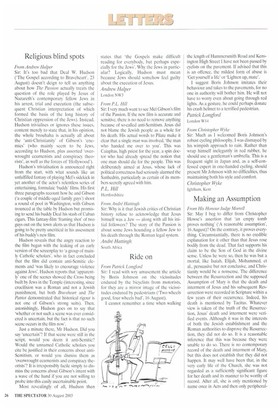Religious blind spots
From Andrew Ha/per
Sir: It's too bad that Deal W. Hudson (-The Gospel according to Braveheart', 23 August) doesn't deign to tell us anything about how The Passion actually treats the question of the role played by Jesus of Nazareth's contemporary fellow Jews in his arrest, trial and execution (the subsequent Christian interpretation of which formed the basis of the long history of Christian oppression of the Jews). Instead, Hudson trivialises or ignores these issues, content merely to state that, in his opinion, the whole brouhaha is actually all about the 'anti-Christianity' of Gibson's 'enemies' (who mainly seem to be Jews, according to Hudson, plus assorted 'overwrought ecumenists and conspiracy theorists', as well as the forces of 'Hollywood.).
Hudson's trivialisation is announced right from the start, with what sounds like an unfulfilled fantasy of playing Mel's sidekick in yet another of the actor's relentless series of entertaining, formulaic 'buddy' films. His first three paragraphs recount how he and Gibson (a couple of middle-aged family guys') shoot a round of pool in Washington, with Gibson trounced at the table by Hudson but promising to send his buddy Deal his stash of Cuban cigars. This fantasy-film 'framing shot' of two guys out on the town alerts us that Hudson is going to be pretty uncritical in his assessment of his buddy's new film.
Hudson reveals that the angry reaction to the film began with the leaking of an early version of the screenplay to 'a group of mainly Catholic scholars', who in fact concluded that the film did contain anti-Semitic elements and 'was likely to encourage violence against Jews'. Hudson reports that 'apparently' one of the scenes showed the Cross being built by Jews in the Temple (interesting, since crucifixion was a Roman and not a Jewish punishment, but both Braveheart and The Patriot demonstrated that historical rigour is not one of Gibson's strong suits). Then, astonishingly, Hudson goes on to say that 'whether or not such a scene was ever considered is uncertain, but the fact is that no such scene occurs in the film now'.
Just a minute there, Mr Hudson. Did you say 'uncertain'? If that scene were still in the script, would you deem it anti-Semitic? Would the unnamed Catholic scholars you cite be justified in their concerns about antiSemitism, or would you dismiss them as 'overwrought ecumenists and conspiracy theorists'? It is irresponsibly facile simply to dismiss the concerns about Gibson's intent with a wave of the hand if you are not willing to probe into this easily ascertainable point.
Most revealingly of all, Hudson then states that 'the Gospels make difficult reading for everybody, but perhaps especially for the Jews'. Why the Jews in particular? Logically, Hudson must mean because Jews should somehow feel guilty about the execution of Jesus.
Andrew Halper
London NW3


























































 Previous page
Previous page